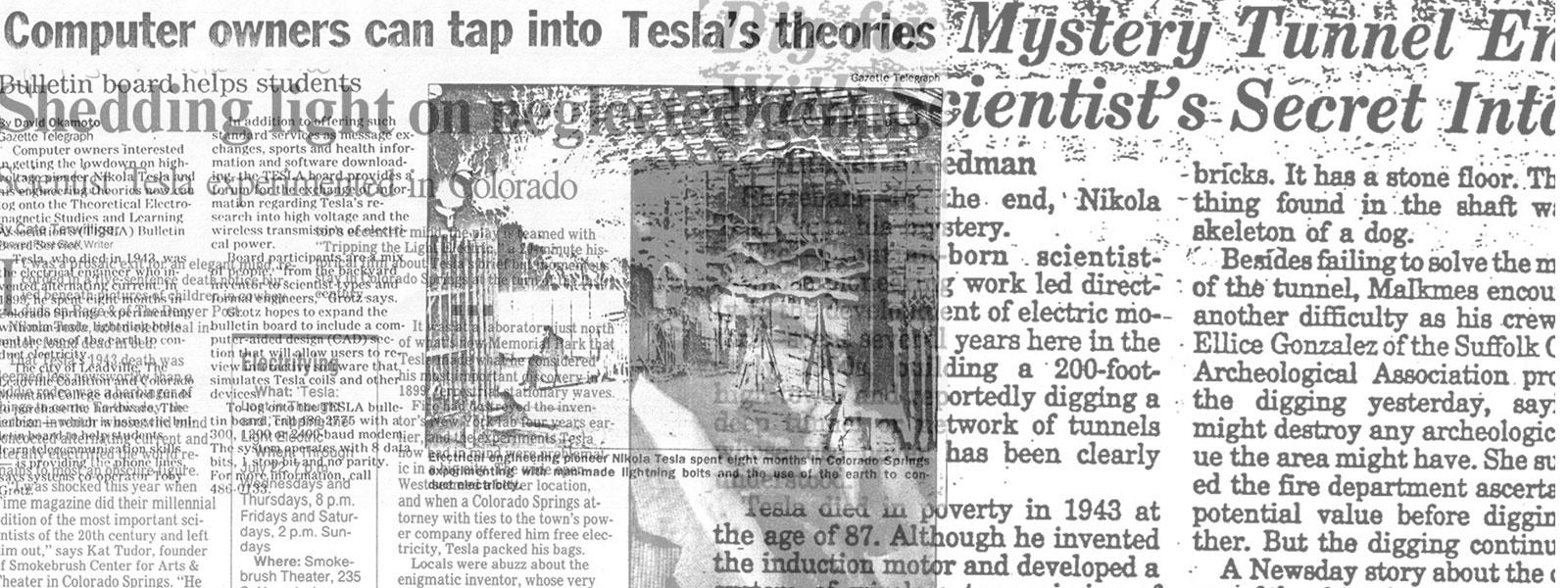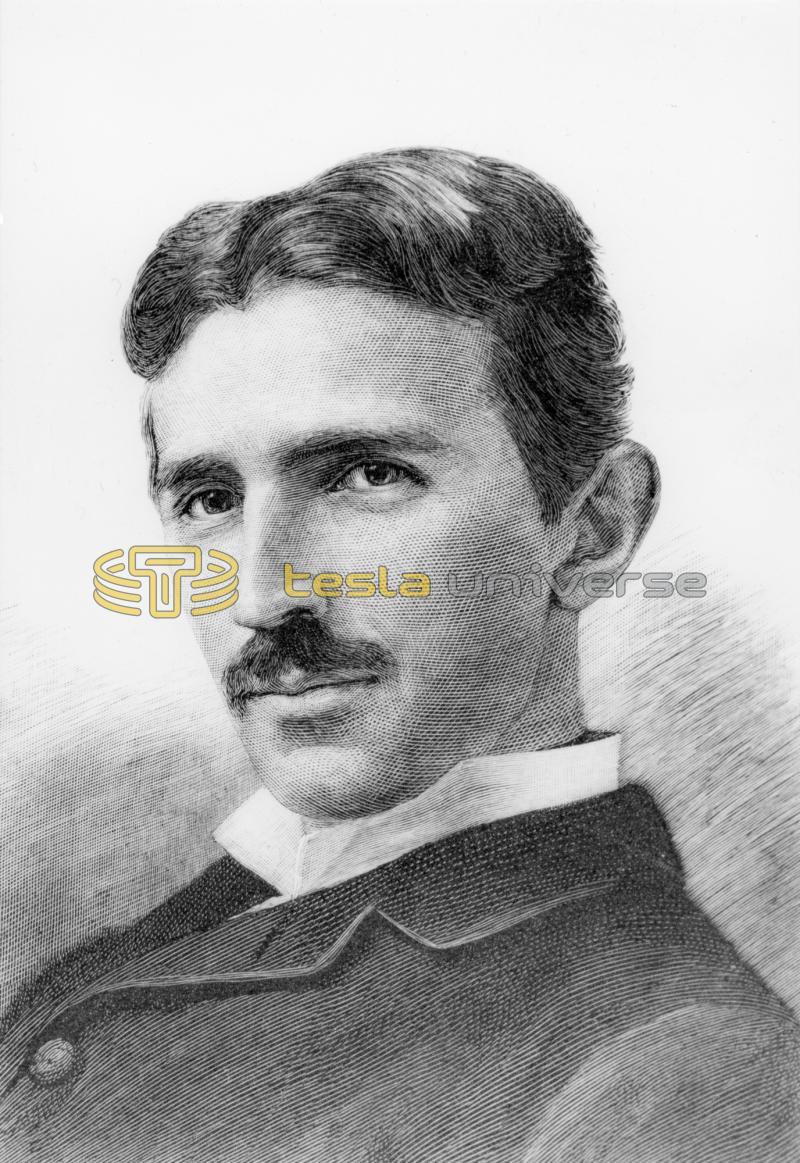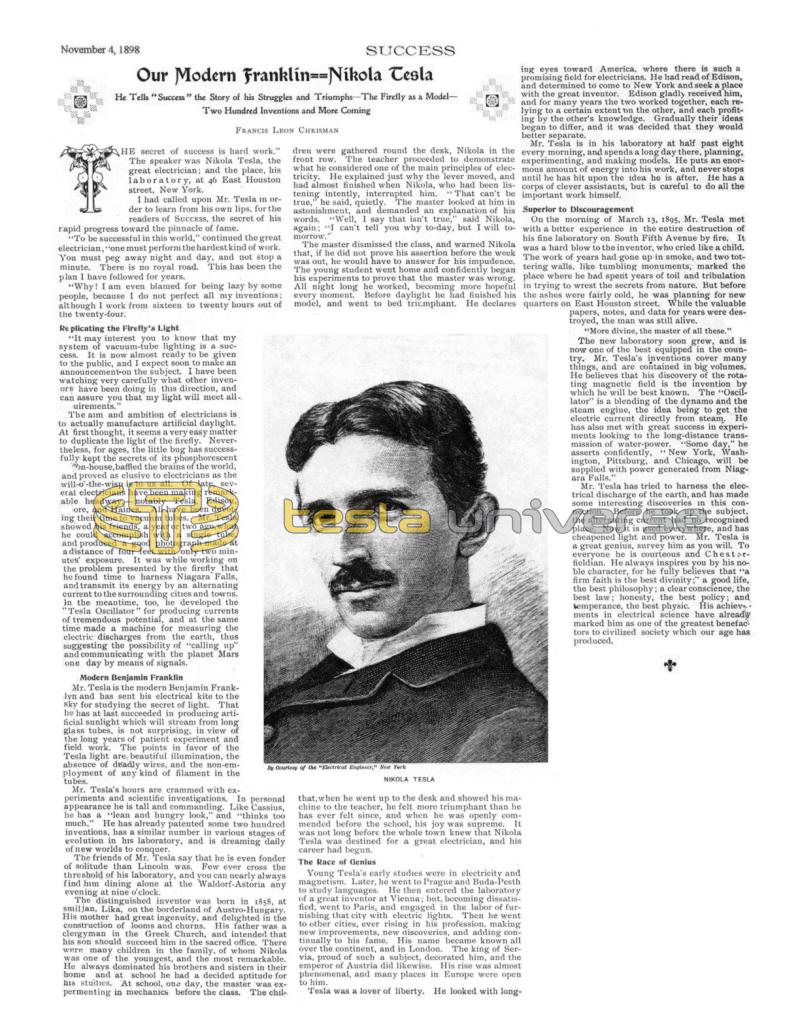
Nikola Tesla Articles
Our Modern Franklin - Nikola Tesla
He Tells "Success" the Story of his Struggles and Triumphs - The Firefly as a Model - Two Hundred Inventions and More Coming
The secret of success is hard work." The speaker was Nikola Tesla, the great electrician; and the place, his laboratory, at 46 East Houston street, New York.
I had called upon Mr. Tesla in order to learn from his own lips, for the readers of Success, the secret of his rapid progress toward the pinnacle of fame.
"To be successful in this world," continued the great electrician, "one must perform the hardest kind of work. You must peg away night and day, and not stop a minute. There is no royal road. This has been the plan I have followed for years.
"Why! I am even blamed for being lazy by some people, because I do not perfect all my inventions; although I work from sixteen to twenty hours out of the twenty-four.
Replicating the Firefly's Light
"It may interest you to know that my system of vacuum-tube lighting is a success. It is now almost ready to be given to the public, and I expect soon to make an announcement on the subject. I have been watching very carefully what other inventors have been doing in this direction, and can assure you that my light will meet all requirements."
The aim and ambition of electricians is to actually manufacture artificial daylight. At first thought, it seems a very easy matter to duplicate the light of the firefly. Nevertheless, for ages, the little bug has successfully kept the secrets of its phosphorescent prison-house, baffled the brains of the world, and proved as elusive to electricians as the will-o'-the-wisp is to us all. Of late, several electricians have been making remarkable headway, - notably Tesla, Edison, Moore, and Haines. All have been devoting their time to vacuum tubes. Mr. Tesla showed his friends, a year or two ago, what he could accomplish with a single tube, and produced a good photograph made at a distance of four feet with only two minutes' exposure. It was while working on the problem presented by the firefly that he found time to harness Niagara Falls, and transmit its energy by an alternating current to the surrounding cities and towns. In the meantime, too, he developed the "Tesla Oscillator" for producing currents of tremendous potential, and at the same time made a machine for measuring the electric discharges from the earth, thus suggesting the possibility of "calling up" and communicating with the planet Mars one day by means of signals.
Modern Benjamin Franklin
Mr. Tesla is the modern Benjamin Franklyn and has sent his electrical kite to the sky for studying the secret of light. That he has at last succeeded in producing artificial sunlight which will stream from long glass tubes, is not surprising, in view of the long years of patient experiment and field work. The points in favor of the Tesla light are beautiful illumination, the absence of deadly wires, and the non-employment of any kind of filament in the tubes.
Mr. Tesla's hours are crammed with experiments and scientific investigations. In personal appearance he is tall and commanding. Like Cassius, he has a "lean and hungry look," and "thinks too much." He has already patented some two hundred inventions, has a similar number in various stages of evolution in his laboratory, and is dreaming daily of new worlds to conquer.
The friends of Mr. Tesla say that he is even fonder of solitude than Lincoln was. Few ever cross the threshold of his laboratory, and you can nearly always find him dining alone at the Waldorf-Astoria any evening at nine o'clock.
The distinguished inventor was born in 1858, at Smiljan, Lika, on the borderland of Austro-Hungary. His mother had great ingenuity, and delighted in the construction of looms and churns. His father was a clergyman in the Greek Church, and intended that his son should succeed him in the sacred office. There were many children in the family, of whom Nikola was one of the youngest, and the most remarkable. He always dominated his brothers and sisters in their home and at school he had a decided aptitude for his studies. At school, one day, the master was experimenting in mechanics before the class. The children were gathered round the desk, Nikola in the front row. The teacher proceeded to demonstrate what he considered one of the main principles of electricity. He explained just why the lever moved, and had almost finished when Nikola, who had been listening intently, interrupted him. "That can't be true," he said, quietly. The master looked at him in astonishment, and demanded an explanation of his words. "Well, I say that isn't true," said Nikola, again; "I can't tell you why to-day, but I will tomorrow."
The master dismissed the class, and warned Nikola that, if he did not prove his assertion before the week was out, he would have to answer for his impudence. The young student went home and confidently began his experiments to prove that the master was wrong. All night long he worked, becoming more hopeful every moment. Before daylight he had finished his model, and went to bed triumphant. He declares that, when he went up to the desk and showed his machine to the teacher, he felt more triumphant than he has ever felt since, and when he was openly commended before the school, his joy was supreme. It was not long before the whole town knew that Nikola Tesla was destined for a great electrician, and his career had begun.
The Race of Genius
Young Tesla's early studies were in electricity and magnetism. Later, he went to Prague and Buda-Pesth to study languages. He then entered the laboratory of a great inventor at Vienna; but, becoming dissatisfied, went to Paris, and engaged in the labor of furnishing that city with electric lights. Then he went to other cities, ever rising in his profession, making new improvements, new discoveries, and adding continually to his fame. His name became known all over the continent, and in London. The king of Servia, proud of such a subject, decorated him, and the emperor of Austria did likewise. His rise was almost phenomenal, and many places in Europe were open to him.
Tesla was a lover of liberty. He looked with longing eyes toward America, where there is such a promising field for electricians. He had read of Edison, and determined to come to New York and seek a place with the great inventor. Edison gladly received him, and for many years the two worked together, each relying to a certain extent on the other, and each profiting by the other's knowledge. Gradually their ideas began to differ, and it was decided that they would better separate.
Mr. Tesla is in his laboratory at half past eight every morning, and spends a long day there, planning, experimenting, and making models. He puts an enormous amount of energy into his work, and never stops until he has hit upon the idea he is after. He has a corps of clever assistants, but is careful to do all the important work himself.
Superior to Discouragement
On the morning of March 13, 1895, Mr. Tesla met with a bitter experience in the entire destruction of his fine laboratory on South Fifth Avenue by fire. It was a hard blow to the inventor, who cried like a child. The work of years had gone up in smoke, and two tottering walls, like tumbling monuments, marked the place where he had spent years of toil and tribulation in trying to wrest the secrets from nature. But before the ashes were fairly cold, he was planning for new quarters on East Houston street. While the valuable papers, notes, and data for years were destroyed, the man was still alive.
"More divine, the master of all these."
The new laboratory soon grew, and is now one of the best equipped in the country. Mr. Tesla's inventions cover many things, and are contained in big volumes. He believes that his discovery of the rotating magnetic field is the invention by which he will be best known. The "Oscillator" is a blending of the dynamo and the steam engine, the idea being to get the electric current directly from steam. He has also met with great success in experiments looking to the long-distance transmission of water-power. "Some day," he asserts confidently, "New York, Washington, Pittsburg, and Chicago, will be supplied with power generated from Niagara Falls."
Mr. Tesla has tried to harness the electrical discharge of the earth, and has made some interesting discoveries in this connection. Before he took up the subject, the alternating current had no recognized place. Now it is used everywhere, and has cheapened light and power. Mr. Tesla is a great genius, survey him as you will. To everyone he is courteous and Chestorfieldian. He always inspires you by his noble character, for he fully believes that "a firm faith is the best divinity;" a good life, the best philosophy; a clear conscience, the best law; honesty, the best policy; and temperance, the best physic. His achievements in electrical science have already marked him as one of the greatest benefactors to civilized society which our age has produced.

